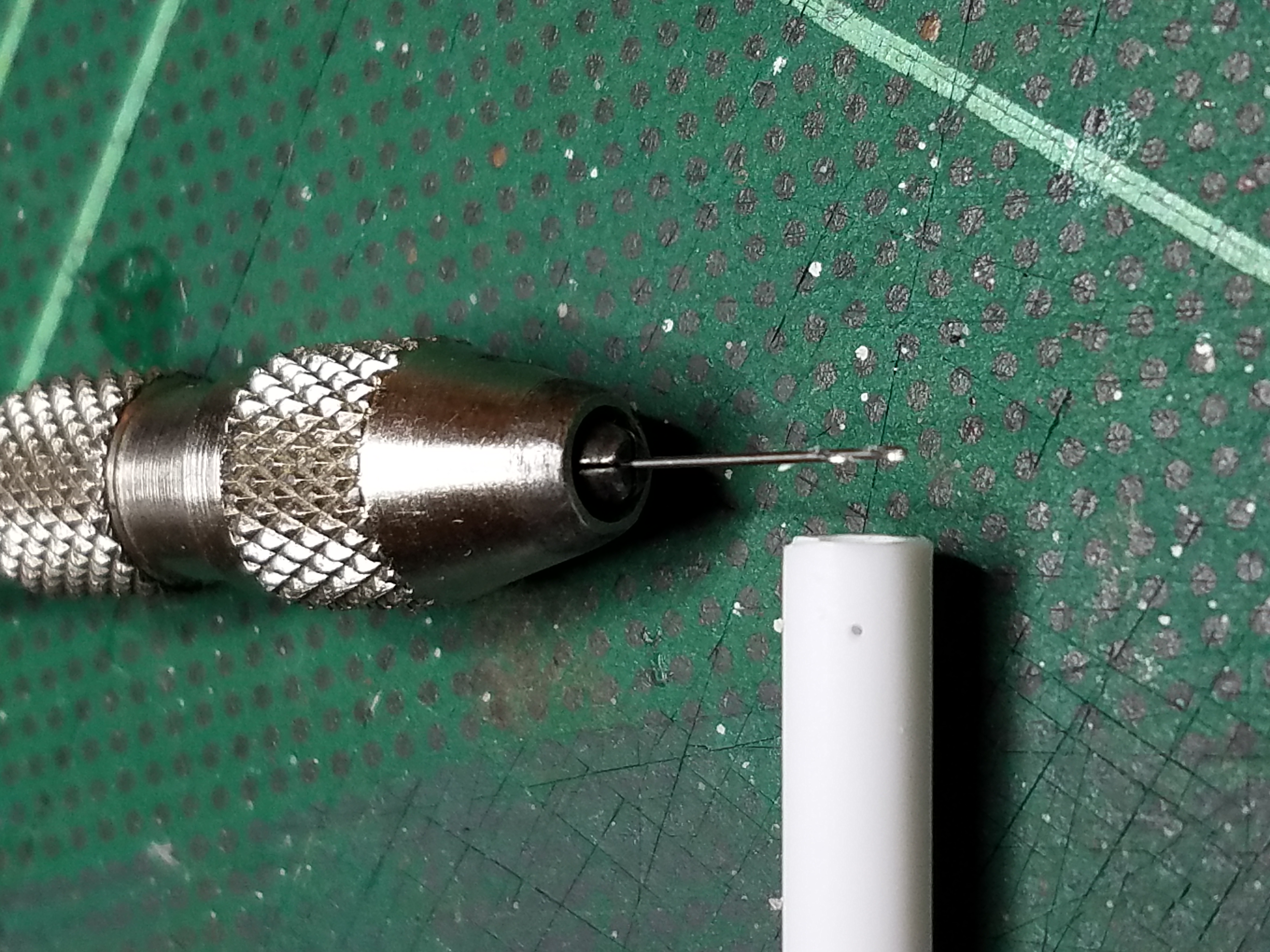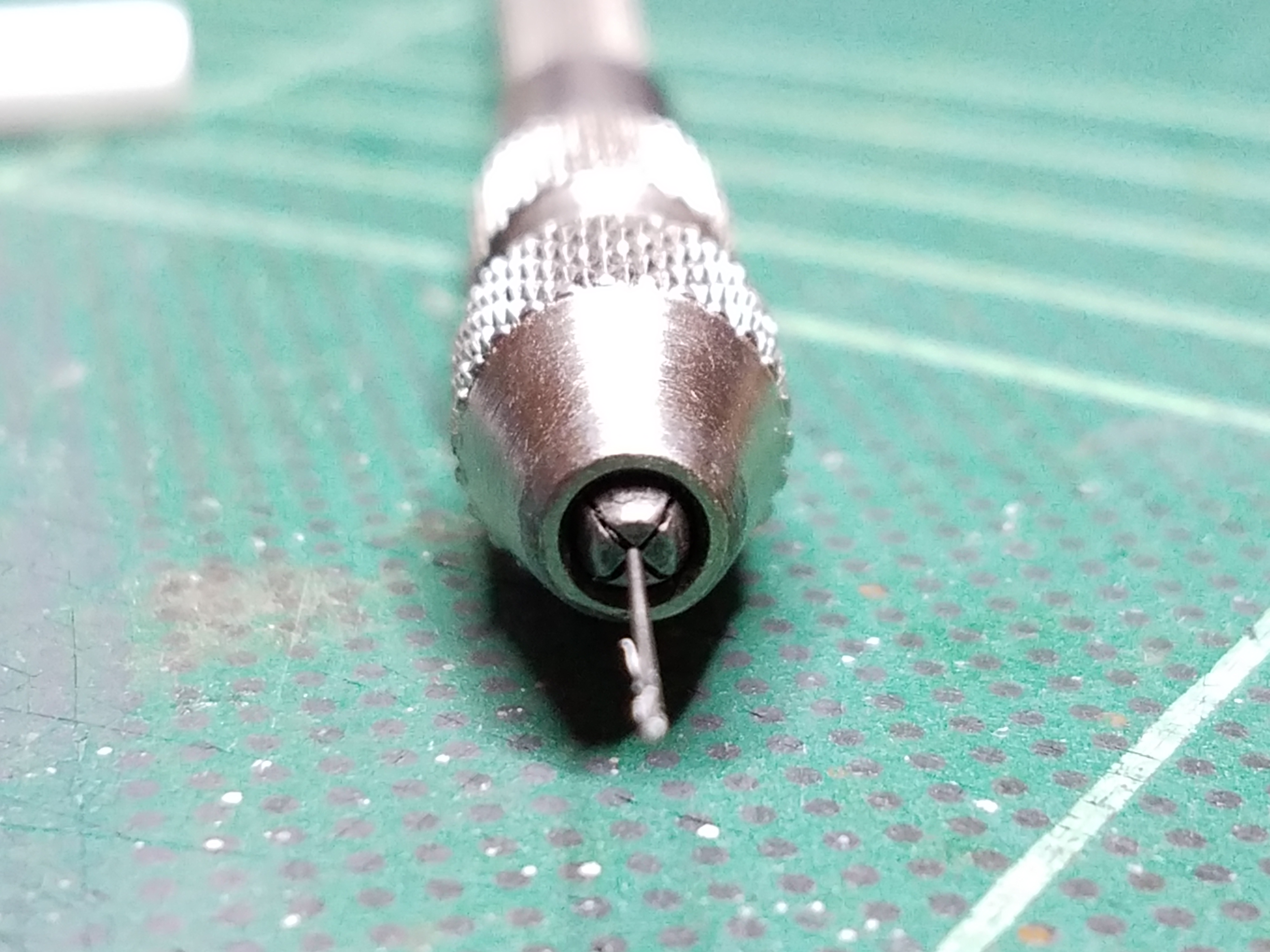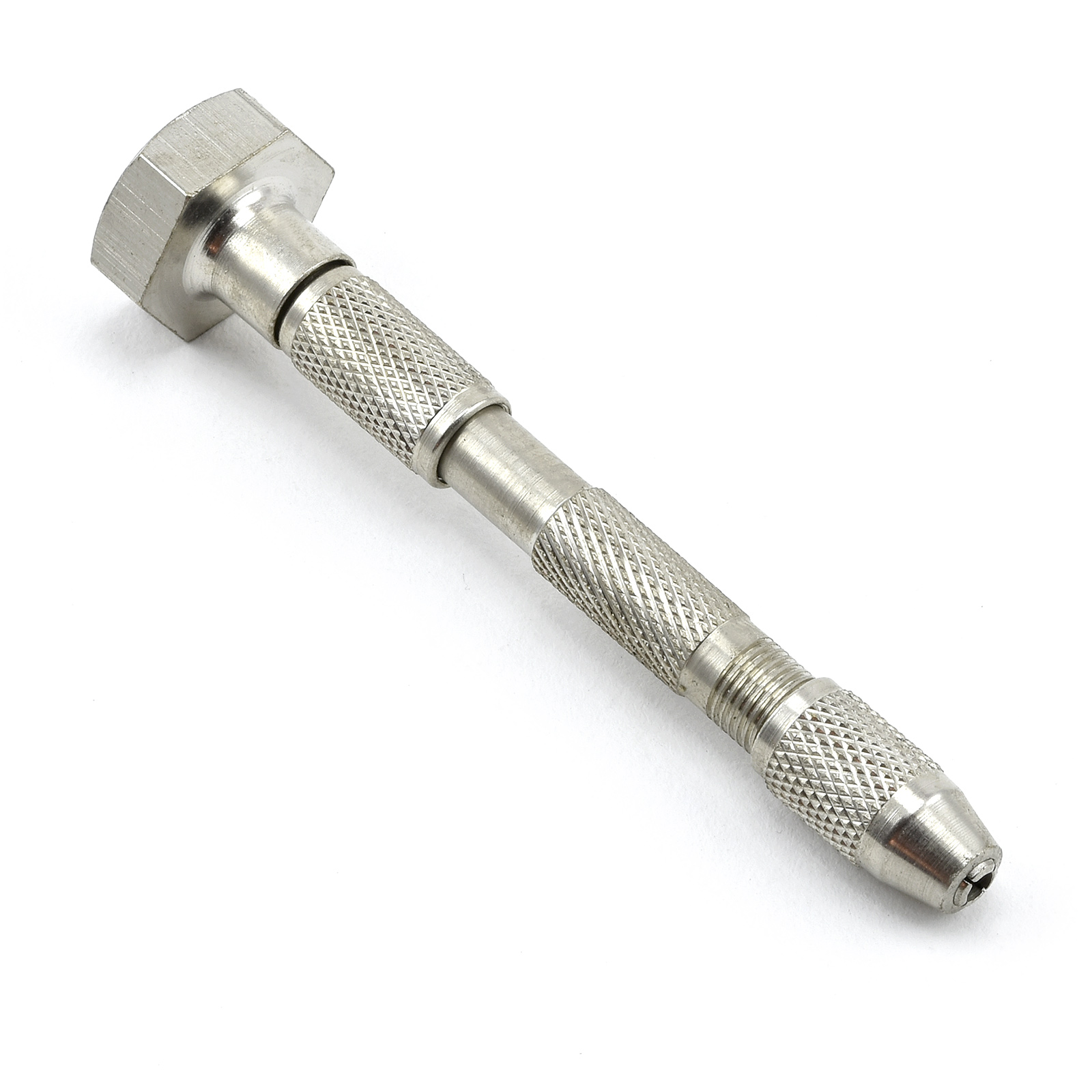Anybody know source for a 4.3mm shank diameter collet with a clamp range down to a #80 (.33mm diameter) drill bit? Smallest clamp size I’ve found so far is .5mm (#76 drill bit).
staybolt,
I would skip the collet and go with a Starrett 240-A pin vise, which has a 0.25-1.4mm (0.010-0.055") clamping range. It grips those tiny drill bits EXTREMELY well (no slippage) and the knurled handle means it won’t slip in your hand either. Yea, it’s going to run you $20+ but it’s worth its weight in gold. I’ve never regretted purchasing it or its slightly larger brother, the 240-B.
Tom
Interesting. I should look into this. My pin vise does slip on occasion, and the drill bits are not all that small.
Rich
The biggest problem with the run of the mill pin vices is lack of concentricity. Most of them won’t clamp a bit in straight. Gotta look into getting those higher priced ones.
Tom,
I would like to invest in quality pin vises such as you suggest. Can you provide a source I can purchase them from?
Thank you,
NHTX
I can get mine from our local Lee Valley Tools store:
And amazon will handle them for you.
Starrett has an online store. If you google their name you’ll find it. The URL link is too big to post here
NHTX,
I would just google “Starrett 240A” and find the best price. Amazon looks like it’s the winner so far. It also gives you a nice photo of what it looks like. Spike’s link above is for the full set of 4. I have the two smaller ones.
As mentioned, the Starrett is not an inexpensive little pen vise…but the knurled nut and 4-piece jaws REALLY helps you tighten down on the #61-#80 bits. If you do get one, let me know how you like it.
Tom
Thank you, Lastspikemike, TStage, and Richhotrain. Mine is ordered, expected arrival Tuesday. I have 5 or 6 “hobbyshop” pinvises that are way less than satisfactory, especially with smaller bits.
Some of the reviews indicate that recent productions of Sterretts have had issues. Can’t verify personally, but it gave me pause.
Let us know how yours turned out, NHTX. I hate to see a good name start the slide into average.
John
I’ll drill by hand up to 3/16" in the right circumstances, especially in softer materials like plastic, wood or aluminum.
John,
I know the Starrett dial calipers the past 20 years are not the same quality as the ones manufactured in the 80s & 90s. I specifically picked up an essentially new Starrett dial caliper off eBay a couple of years back from an retired engineer that received it at his first post-college job in '79 but never used it. It’s beaut-i-ful and the rack 'n pinion mechanism is tight & smoooooth. Worth the $$$ in my book.
And, while I’ve been pleased with my Starrett pin vises, like you - I hope the overall quality of the Starrett line of precision tools isn’t slipping. I know our late beloved Randy (rrinker) said the Weller soldering stations are not the defacto soldering stations that they once were years ago. I hate seeing that. [:(]
Tom
Evening
I had several micro trains coupler conversion kits that were sitting on the back burner waiting to be installed. With those of course I had to get the drill and tap set. I don’t have much small tooling supplies with my large variety of construction bits and drivers of all the standard types.
It was late evening and everything was closed when I finally got the ambition to take on installing the coupler conversions. I had a mini 12V screwdriver drill but it wasn’t small enough and the micro bits wouldn’t clamp at all in the chuck. Although I realized it wasn’t the ideal way to go about things I didn’t have much of a choice that night.
I took a small piece of masking tape and wrapped it tight around the tail end of the drill bit, Scotch tape on the really tiny one. It worked like a champion and I’ve been doing it that way ever since.
I would like to get one of these tools talked about here as the tape wears off and comes off. But I’ve had my eye on the new and improved Kreg Jig and I have plenty of tape.
TF
I see there are a lot of pin vise devotees. I do use mine occasionally for certain tasks, but I like the control I get with my Dremel tool mounted on a stand that then functions as a drill press.
After some more looking, I found a set of collets on Amazon that showed a clamping range for each of the individual collets. The .5mm one had a range of .3mm -.6mm. That covers the smallest drill bit I have, viz. #80(.33mm). I decided to give it a try, and since the set could be returned free-of-charge, I wasn’t taking much of a chance. The “prime” delivery was only one day so I have them in hand already. Sure enough, the .5mm collet grabs a #80 bit tightly. I noticed the collet shank is 4.1mm instead of the claimed 4.3mm. The “slop” is taken up, however, when the collet nut is tightened, squeezing the collet claws against the drill bit. The inner contour of the collet nut centers the collet in the chuck.
Sooo…I’m a happy clam!
Because your talking collets and the only tool I know that uses collets is the Dremel. I solved the collet problem by purchasing the Dremel adjustable chuck. It easily grips a #80 bit and no more collets.
Mel

My Model Railroad
http://melvineperry.blogspot.com/
Bakersfield, California
Turned 84 in July, aging is definitely not for wimps.
Micromark makes or sells good stuff. Is the collet accurate?
The single ended pin vice with rotating cap is the better design than any double ended version. The hex design facilitates aligning the pin vice in the palm while rotating it with the fingers. The accurate way to drill.
OK, so your drill bit is too small for your smallest pin vise. Yes, you could order one that will work, but that puts your project back at least a week - or more.
The thing is, you want a fix NOW. I’ve been there, and found there is a quick and almost easy help. Cut a piece of tape - I prefer quality electrical tape - and wrap it evenly around the bit. For hand powered cutting or drilling, it works like a charm.
For use in a Dremel tool (or similar), it takes a more precise tape job, to assure its an even thickness all around the bit so as to prevent any possibility of a wobble.
I’d still order the needed pin vise, but for now…tape the bit.
As promised, I ordered my Starrett 240-A pin vise, and received it on March 8. It is a well made tool. My opinion in two words: Not impressed. Actually, disappointed.
Initially, I put a new, number 79 drill bit into it, and attempted to drill through a piece of 0.040 styrene. Without ever piercing the plastic, it was necessary to loosen the chuck, find the bit which had shot up inside the jaws three times, without ever piercing the styrene.
Investigation revealed the jaws of the chuck to be very thinly made, even in the gripping surfaces. I suppose this is to allow the jaws to flex enough to accept the smaller bits. The pin vise may be okay for thinner plastic, or thin wood but I was going to use it on diesel and rolling stock body shells, which are way thicker than 0.040. If there was a way to install a metal “stop” inside the shaft of the jaws and prohibit the bit from traveling up inside the shaft, Starrett might be onto something with this tiny pinvise.
NHTX
Wow! I’m sorry to hear about the poor results with your Starrett 240A, NHTX.
As an experiment I just installed a #80 drill bit in my 240A and hand-drilled a hole in 5/32" OD (0.031" walls) styrene tubing in ~10 sec. Zero slippage and NO re-tightening necessary:

Here’s what the jaws on my 240A look like clamped down onto the #80 drill bit. Is that what you see with your pin vise? Or, are the jaws thinner? Also, do the 4 jaws on your pin vise close ALL the way shut w/o a drill bit inserted?

